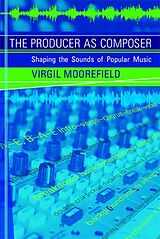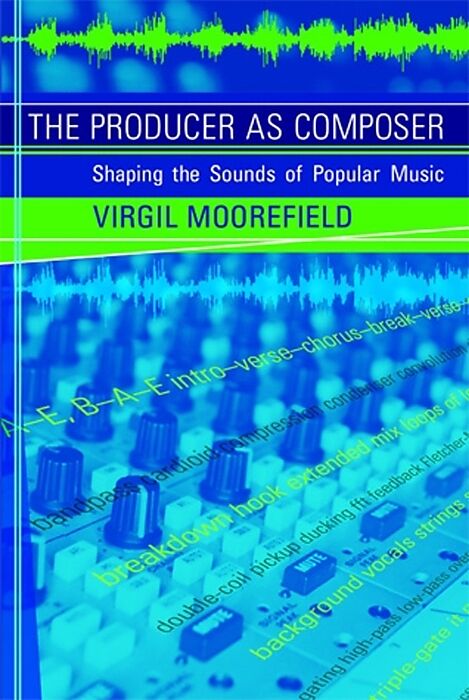The Producer as Composer
Einband:
Kartonierter Einband
EAN:
9780262514057
Untertitel:
Shaping the Sounds of Popular Music
Autor:
Virgil Moorefield
Herausgeber:
MIT Press
Anzahl Seiten:
164
Erscheinungsdatum:
26.02.2010
ISBN:
0262514052
Zusatztext An enjoyable read, liberally peppered with anecdotes that humanize the people involved in the transformation of recording from a strictly technical attempt to capture a live performance to an artistically crucial element of modern music. Kent Williams Groove Informationen zum Autor Virgil Moorefield Klappentext The evolution of the record producer from organizer to auteur, from Phil Spector and George Martin to the rise of hip-hop and remixing. In the 1960s, rock and pop music recording questioned the convention that recordings should recreate the illusion of a concert hall setting. The Wall of Sound that Phil Spector built behind various artists and the intricate eclecticism of George Martin's recordings of the Beatles did not resemble live performancesin the Albert Hall or elsewherebut instead created a new sonic world. The role of the record producer, writes Virgil Moorefield in The Producer as Composer, was evolving from that of organizer to auteur; band members became actors in what Frank Zappa called a "movie for your ears." In rock and pop, in the absence of a notated score, the recorded version of a songcreated by the producer in collaboration with the musiciansbecame the definitive version. Moorefield, a musician and producer himself, traces this evolution with detailed discussions of works by producers and producer-musicians including Spector and Martin, Brian Eno, Bill Laswell, Trent Reznor, Quincy Jones, and the Chemical Brothers. Underlying the transformation, Moorefield writes, is technological development: new techniquestape editing, overdubbing, compressionand, in the last ten years, inexpensive digital recording equipment that allows artists to become their own producers. What began when rock and pop producers reinvented themselves in the 1960s has continued; Moorefield describes the importance of disco, hip-hop, remixing, and other forms of electronic music production in shaping the sound of contemporary pop. He discusses the making of Pet Sounds and the production of tracks by Public Enemy with equal discernment, drawing on his own years of studio experience. Much has been written about rock and pop in the last 35 years, but hardly any of it deals with what is actually heard in a given pop song. The Producer as Composer tries to unravel the mystery of good pop: why does it sound the way it does? Zusammenfassung The evolution of the record producer from organizer to auteur, from Phil Spector and George Martin to the rise of hip-hop and remixing. In the 1960s, rock and pop music recording questioned the convention that recordings should recreate the illusion of a concert hall setting. The Wall of Sound that Phil Spector built behind various artists and the intricate eclecticism of George Martin's recordings of the Beatles did not resemble live performancesin the Albert Hall or elsewherebut instead created a new sonic world. The role of the record producer, writes Virgil Moorefield in The Producer as Composer , was evolving from that of organizer to auteur; band members became actors in what Frank Zappa called a "movie for your ears." In rock and pop, in the absence of a notated score, the recorded version of a songcreated by the producer in collaboration with the musiciansbecame the definitive version. Moorefield, a musician and producer himself, traces this evolution with detailed discussions of works by producers and producer-musicians including Spector and Martin, Brian Eno, Bill Laswell, Trent Reznor, Quincy Jones, and the Chemical Brothers. Underlying the transformation, Moorefield writes, is technological development: new techniquestape editing, overdubbing, compressionand, in the last ten years, inexpensive digital recording equipment that allows artists to become their own producers. What began when rock and pop producers reinvented themselves in the 1960s has continued; Moorefield describes the importance of di...
Autorentext
Virgil Moorefield
Klappentext
The evolution of the record producer from organizer to auteur, from Phil Spector and George Martin to the rise of hip-hop and remixing.In the 1960s, rock and pop music recording questioned the convention that recordings should recreate the illusion of a concert hall setting. The Wall of Sound that Phil Spector built behind various artists and the intricate eclecticism of George Martin's recordings of the Beatles did not resemble live performances—in the Albert Hall or elsewhere—but instead created a new sonic world. The role of the record producer, writes Virgil Moorefield in The Producer as Composer, was evolving from that of organizer to auteur; band members became actors in what Frank Zappa called a "movie for your ears." In rock and pop, in the absence of a notated score, the recorded version of a song—created by the producer in collaboration with the musicians—became the definitive version. Moorefield, a musician and producer himself, traces this evolution with detailed discussions of works by producers and producer-musicians including Spector and Martin, Brian Eno, Bill Laswell, Trent Reznor, Quincy Jones, and the Chemical Brothers. Underlying the transformation, Moorefield writes, is technological development: new techniques—tape editing, overdubbing, compression—and, in the last ten years, inexpensive digital recording equipment that allows artists to become their own producers. What began when rock and pop producers reinvented themselves in the 1960s has continued; Moorefield describes the importance of disco, hip-hop, remixing, and other forms of electronic music production in shaping the sound of contemporary pop. He discusses the making of Pet Sounds and the production of tracks by Public Enemy with equal discernment, drawing on his own years of studio experience. Much has been written about rock and pop in the last 35 years, but hardly any of it deals with what is actually heard in a given pop song. The Producer as Composer tries to unravel the mystery of good pop: why does it sound the way it does?

Leider konnten wir für diesen Artikel keine Preise ermitteln ...
billigbuch.ch sucht jetzt für Sie die besten Angebote ...
Die aktuellen Verkaufspreise von 6 Onlineshops werden in Realtime abgefragt.
Sie können das gewünschte Produkt anschliessend direkt beim Anbieter Ihrer Wahl bestellen.
Loading...
Die aktuellen Verkaufspreise von 6 Onlineshops werden in Realtime abgefragt.
Sie können das gewünschte Produkt anschliessend direkt beim Anbieter Ihrer Wahl bestellen.
| # | Onlineshop | Preis CHF | Versand CHF | Total CHF | ||
|---|---|---|---|---|---|---|
| 1 | Seller | 0.00 | 0.00 | 0.00 |
